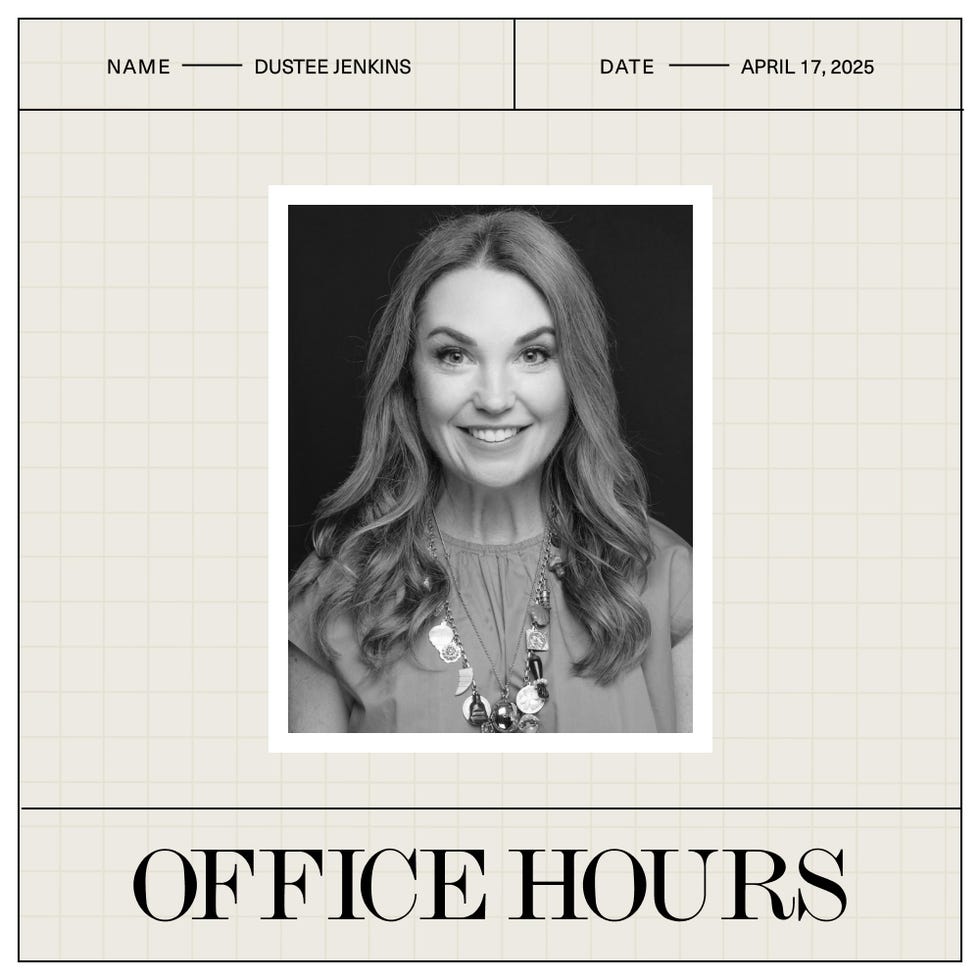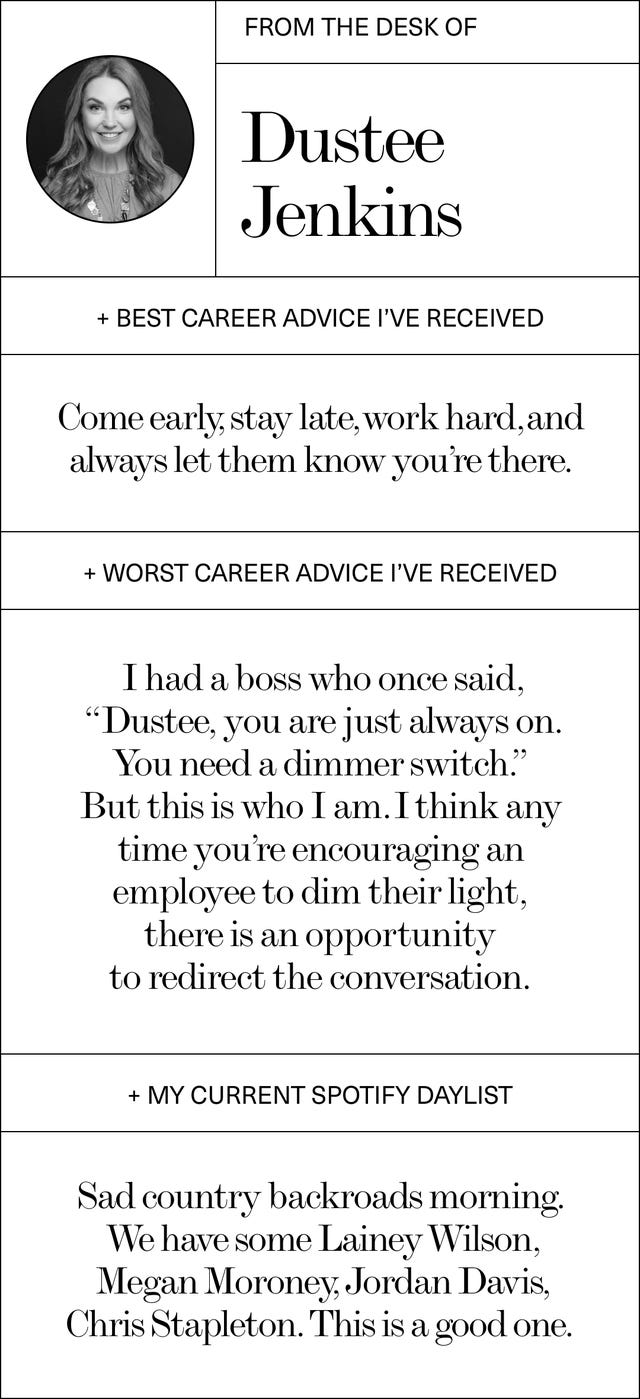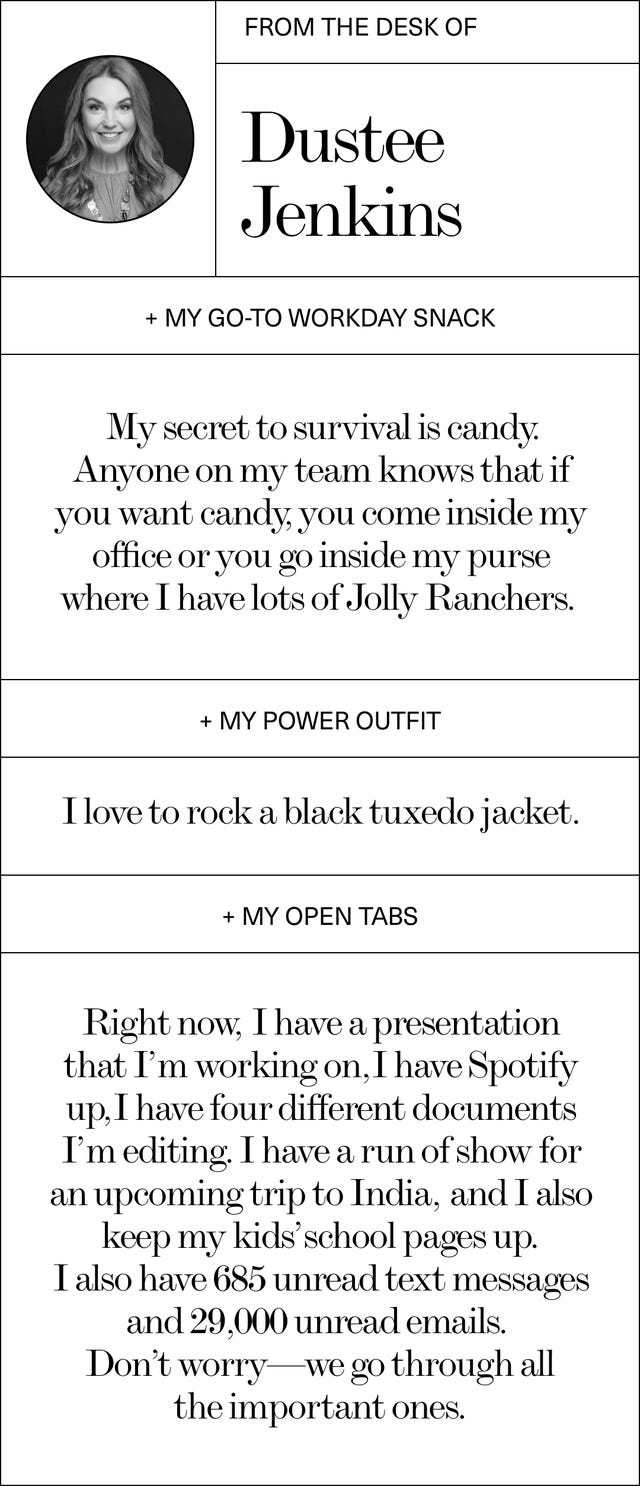How Spotify’s Dustee Jenkins Balances Pop Stars and Prime Ministers


In ELLE’s series Office Hours, we ask people in powerful positions to take us through their first jobs, worst jobs, and everything in between. This month, we spoke with Dustee Jenkins, a Texas native whose communication prowess has led her from the halls of Congress to her current role as Spotify’s chief public affairs officer. After studying journalism in college, Jenkins moved to Washington, D.C. to work for Sen. Kay Bailey Hutchison’s office, eventually becoming press secretary, and later joining President George W. Bush’s administration. Post-politics, she headed to Target, where she helped guide the company through a major data breach—while also nearly nine months pregnant. Now, at the über-popular streaming service, Jenkins oversees all things related to public relations and communications, in addition to working on policy. “It is exhilarating on one hand and then incredibly complex on the other,” she says of the job. “The combination is just the right amount for me to be interested every day.” Below, Jenkins presses pause on her busy schedule to look back at her career—including the snack she calls the “secret to survival” and how she’s embraced both messy problems and inevitable challenges.
My first “big girl” jobI always wanted to have an impact and make a difference; I grew up in this very civic-minded family who believed in doing your part. I was in college, and 9/11 had happened, and I decided I wanted to go to Washington, D.C. and work in the government. I got an opportunity to work in a senator’s office, but I started at the very bottom. I worked in the mail room, I answered the phone, I gave tours. I loved it. And I desperately wanted to work in the press office. I graduated with a degree in journalism—I wanted to be working on storytelling and writing—but I decided to be the very best phone-answerer imaginable as a way to really prove myself.
My worst jobI’ve had some doozies. Growing up, to get money to buy a prom dress or go out on the weekends, I babysat a lot. I had some great gigs, but I also had this group of brothers, and they were mischievous—oh, they were naughty. One night, they called me out onto a balcony that overlooked their backyard to tell me that one of the brothers had gotten hurt. So I got out onto their little deck, and they locked me out. I couldn’t get down, and I didn’t have a phone. I’m yelling down, trying to tell the neighbor to call the police to come and get me. Needless to say, I had to tell that family to lose my phone number. After that, I decided to be a little more selective about my babysitting gigs.

I grew up in a really small town in Texas that had maybe five stoplights. You knew most of the people there, and that creates this wonderful sense of comfort, since there’s always this big safety net underneath you, but it also creates this constant observation and these expectations that are set for young people. Learning and growing happens in a safe space, but it also happens with a lot of attention. I am so grateful—it was a little slice of Americana. But I also sort of knew that it probably would not be enough for me.
When I was in high school, my mom brought me to New York City, and I fell in love. I just kept thinking, “Someday, I’m going to live here.” So to now be raising children in New York City is this wonderful full-circle gift. And I still have my four best friends from high school. They are in my corner, and they know exactly who I am, flaws and all. So I get both—the big city and the small town, and those two elements really shape who I am.
An important lesson from working on the HillOne of the things I really admired is that the women [in Congress] caucus together a lot—they often sought each other out and would find ways to work across party lines to get important things done. When I worked for Senator [Kay Bailey] Hutchison, this caucus of women came together and found a solution so that the AMBER Alert system could get passed. And they did that over and over; they met weekly, and it would be Senator [Hillary] Clinton from New York and Senator Hutchison from Texas and Senator [Dianne] Feinstein from California. And their personal politics could not be more different, but their desire to see good done in the world was the same.
How I went from politics to Target to SpotifyWhen choosing a career, it’s super important to have a core of something you love. For me, that core has been storytelling, and this love of writing and communications, debate, discussion, and dialogue. Stories can inspire us; they can instill in us a belief in something beyond ourselves. When you think about those first days [when I worked] in politics, I learned heart and hustle and storytelling about policy issues. When I left politics, I went into crisis communication, and I was telling stories about how a company was trying to help itself or about some financial transaction they were proposing and why it was necessary. As you get good at the thing you love, it will become this thread that you can build on and move into all these different directions. But when I think about those early days, those core fundamentals have carried me through.

Lainey Wilson and Dustee Jenkins.
In this role, I lead several parts of Spotify: I have the PR and communications elements, which are really fun. You work with artists, you do album release events, the Cannes Film Festival. That part is really exciting. But then I also lead a lot of the company’s policy work, working with governments around the world to shape the legal guidelines that enable Spotify to operate in their countries. Sometimes that means I’m pushing back on them. I worked with the previous prime minister and the current prime minister of the U.K. on a law that I think will help with internet competition, which is not a sexy topic, but is very important. I’m very well-steeped in issues related to monopolies and internet competition, which is not something you would think of when you see me at a Sabrina Carpenter event. I’m also working to ensure that content around the world can stay up, and we can have a lot of dialogue and debate and discussion. That’s what makes the role so interesting—it is exhilarating on one hand and incredibly complex on the other. The combination is just the right amount for me to be interested every day.
Why I love big, messy problemsI’m always attracted to heart and hustle. There are going to be people who are smarter than me in a room, but they probably won’t outwork me. Part of it is because I believe so much in what I’m doing, and part of it is because I know that if I want a great result, I have to go earn it. I always say to my team, “There are going to be problems at Spotify that people are afraid to tackle. Run toward those big problems, because they’re messy and hard, and we’ll learn and grow, and it will allow us to demonstrate our capabilities in an area that no one wants to touch.” I like messy. I like a hard challenge.

As hard as it is, failure is how we learn. And I know that’s so easy to say. I just had a presentation at the company—25 years into my career—that just did not go well. And I learned more from that one presentation than I learned from the 50 others that went incredibly well in the last year. It is in that failure where the growth occurs. And I learned that, 25 years in, things will still go wrong, and you’ll still be okay the next day. The sum of my parts at Spotify is not one bad presentation; it is what I do day in and day out and how I deliver and how I contribute. Resiliency is a core fundamental to success in work—your ability to take the punch, the feedback, the negative moment and get back up again. And the next day I was reflective, and I was also just fine.
The artists I’m really impressed by these daysSpotify has long championed the up-and-coming artists, so the Best New Artist category at the Grammys is always a really exciting one for us to watch. For most of these artists, they’ve been at it for nearly a decade. You think about an artist like Sabrina [Carpenter], like Chappell [Roan], like Shaboozey. I was having this conversation with Gracie Abrams, and we were talking about, Are you able to sort of step out and see what all this means in the midst of all the success? And she was saying, “It’s still wild.” I can tell from each of them that they’re very careful to not drink their own Kool-Aid. They know exactly who they are, and they’re very protective of that. I think that’s something that’s happened in the last couple of years, that artists are willing to set their own boundaries. But to watch them rise to Best New Artist is pretty special.
This interview has been condensed and edited for clarity.
elle





